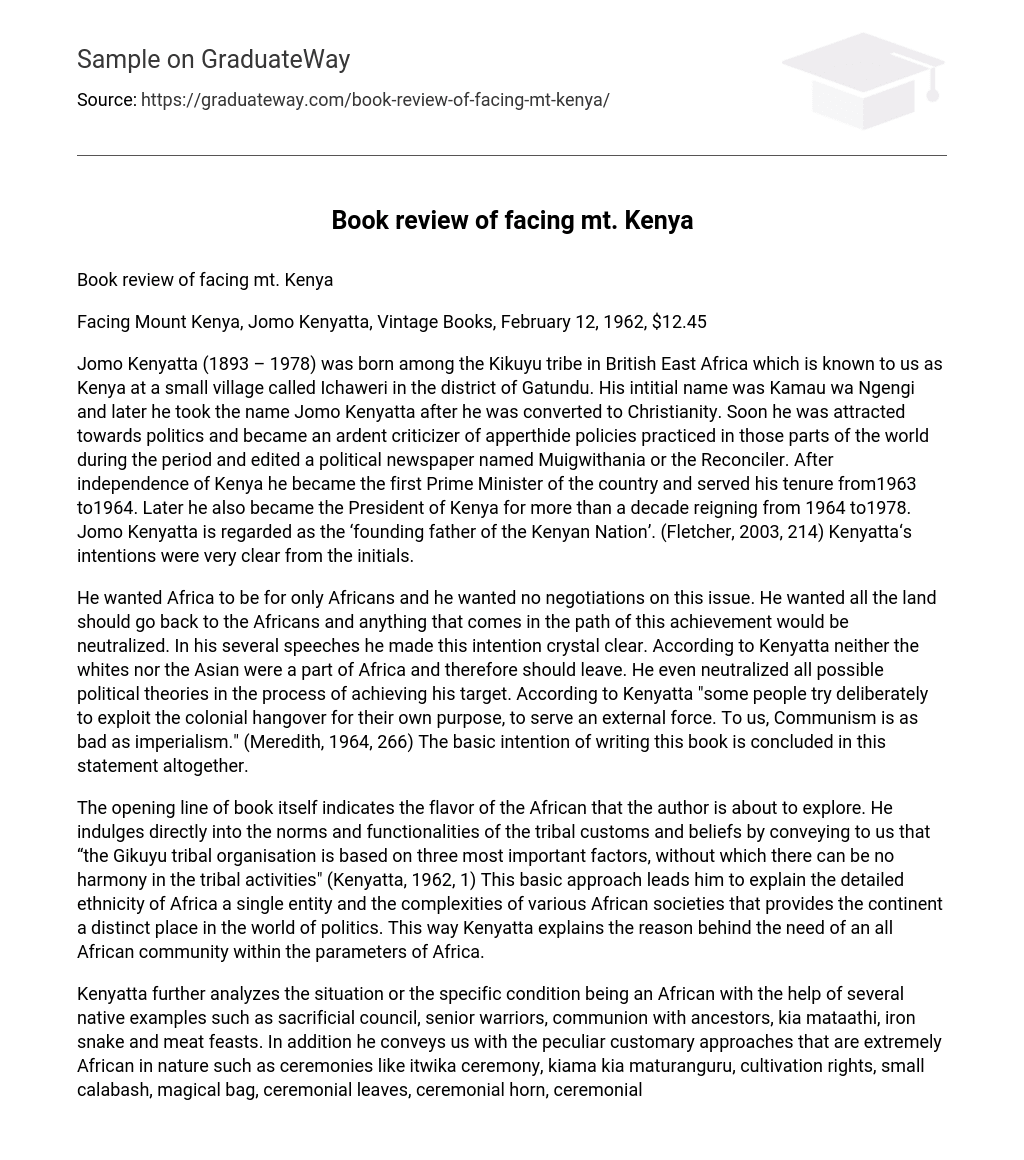Facing Mount Kenya, Jomo Kenyatta, Vintage Books, February 12, 1962, $12.45
Jomo Kenyatta (1893 – 1978) was born among the Kikuyu tribe in British East Africa which is known to us as Kenya at a small village called Ichaweri in the district of Gatundu. His intitial name was Kamau wa Ngengi and later he took the name Jomo Kenyatta after he was converted to Christianity. Soon he was attracted towards politics and became an ardent criticizer of apperthide policies practiced in those parts of the world during the period and edited a political newspaper named Muigwithania or the Reconciler. After independence of Kenya he became the first Prime Minister of the country and served his tenure from1963 to1964. Later he also became the President of Kenya for more than a decade reigning from 1964 to1978. Jomo Kenyatta is regarded as the ‘founding father of the Kenyan Nation’. (Fletcher, 2003, 214) Kenyatta‘s intentions were very clear from the initials.
He wanted Africa to be for only Africans and he wanted no negotiations on this issue. He wanted all the land should go back to the Africans and anything that comes in the path of this achievement would be neutralized. In his several speeches he made this intention crystal clear. According to Kenyatta neither the whites nor the Asian were a part of Africa and therefore should leave. He even neutralized all possible political theories in the process of achieving his target. According to Kenyatta “some people try deliberately to exploit the colonial hangover for their own purpose, to serve an external force. To us, Communism is as bad as imperialism.” (Meredith, 1964, 266) The basic intention of writing this book is concluded in this statement altogether.
The opening line of book itself indicates the flavor of the African that the author is about to explore. He indulges directly into the norms and functionalities of the tribal customs and beliefs by conveying to us that “the Gikuyu tribal organisation is based on three most important factors, without which there can be no harmony in the tribal activities” (Kenyatta, 1962, 1) This basic approach leads him to explain the detailed ethnicity of Africa a single entity and the complexities of various African societies that provides the continent a distinct place in the world of politics. This way Kenyatta explains the reason behind the need of an all African community within the parameters of Africa.
Kenyatta further analyzes the situation or the specific condition being an African with the help of several native examples such as sacrificial council, senior warriors, communion with ancestors, kia mataathi, iron snake and meat feasts. In addition he conveys us with the peculiar customary approaches that are extremely African in nature such as ceremonies like itwika ceremony, kiama kia maturanguru, cultivation rights, small calabash, magical bag, ceremonial leaves, ceremonial horn, ceremonial council, ceremonial elders and mondo mogo. According to Kenyatta these are what true Africa actually stands for and no outsiders, whites or Asian, can ever blend into these rites and rituals. Kenyatta presents example upon example to prove his point and intention time and again in this book. The African nationalism that he signifies is predominantly about being with nature and understanding ancient ways with respect. Thus Kenyatta speaks about male goat sacrifice, love magic, tribal legend, and leading elder and tribal organization along with the custom of circumcised youth, to prove his point.
However, Kenyatta is not all looking at the past to yield the harvest of future. Therefore he skillfully indicates the drawbacks of British Government or any other foreign government for that matter and speaks of the height of Mount Kenya with thorough romanticism without forgetting its Lord of Nature and High God or even speaks in a more romantic manner about the legendary African Empire.
It could well be mentioned that this is an invaluable resource as a primary text source because it provides the insight and analytical approach of African culture especially pre-Mau Mau Gikuyu ceremonial rites in great details. For students of anthropology who are in favor for structuralism may however find a lot of conclusions very difficult to understand and there are paradoxes in more then once sense in the proceedings. For example it can be mentioned that human behavior variables are complicated to comprehend as they are always referred to as a fixed cultural entity. With such diversity a conclusion of a single cultural aspect is hard to comprehend. But for students studying the facets of colonial Africa this book ‘Facing Mt. Kenya’ is a valuable text. This provides a very excellent insight of post-colonial and colonial Kenya. However, it can also be stated that that the post colonial strategies of Kenyatta is itself an interesting topic and not very beyond the margins of criticisms and thus a book by the same person makes an attention-grabbing text without doubt. Though it is a troublesome book at times it is simply a necessity beyond any doubts and so it is recommended highly and should be read without any specific prejudice.
Reference:
Fletcher, R; 2003; The Art of Politics. Beliefs and Knowledge: Believing and Knowing; Howard & Price
Kenyatta, Jomo; 1962; Facing Mount Kenya; Vintage Books
Meredith, Martin; 1964; The Fate of Africa, National Book Trust





